Moe
First Year Teaching
28 10 15 16:42 Filed in: Young Adults 1970s
Teaching was an obvious, perhaps the only, choice for us to study after Matriculation (Year12). The Commonwealth Government provided scholarships to cover fees, but the State offered studentships for prospective teachers, which had a wage as well. Women studentship holders weren't allowed to marry until they finished their course. Margaret remembers the Monash Teachers College Principal at an initial meeting with all studentship holders from the uni, saying, "If he's tall, dark and handsome, tell him he has to wait for you for four years." Both men and women had to apply for country schools and go wherever they were sent for their first year of teaching. After that they were free to apply elsewhere. This meant that country schools had a succession of inexperienced first year teachers. Both Sue at Sale and Margaret at Moe had seventeen first year out colleagues during their first years.
LIFE OPENS UP AT SALE HIGH SCHOOL 1971
What a learning curve!!! Out in the wide world and what a wonderful world it turned out to be; very scary for a few months but exciting. The scary part was the teaching; the exciting part was the socialising and the ‘abentures.’
Having been granted a studentship I was legally bound to apply for country schools I was more than happy to do so and applied for Mansfield, Alexandra Omeo Corryong etc etc. We had to apply for at least twenty schools and I hoped I would be appointed to one of these most desirable of locations so that I could learn to ski and continue bushwalking. I was appointed to Sale High School and informed in the letter to report at the beginning of Term 1 1971 to Mr A Aitchison, the Principal. Terrifying reality.
I set off the day before the beginning of Term 1, all my possessions crammed into my Hillman Minx, and headed off to a new life and a huge learning curve. I had booked a room at the Midtown Motel in Sale, this in itself a new experience, and on arrival, settled in to nervously await the next day. Unknown to me I was not alone, as seventeen other young teachers were also beginning their teaching careers at Sale the next day.
Our introduction to teaching was quite perfunctory and most inadequate. On arrival in the Principal’s office we were given a teaching allocation, a time table and a list of Estate Agents. I discovered that I was to teach every year level, including Year 11 and 12 and run the Art Department that the previous Head had left bankrupt. Ridiculous!!! The students arrived back the next day at 9 AM and Term 1 began, despite the record floods that had inundated half the school grounds . In the meantime we had a short Staff Meeting and were then given the afternoon to find somewhere to live, hence the list of Estate Agents.
House hunting began . Armed with our list Karin Frede and I set off. Karin was a German and English first year teacher and fortunately for both of us, our partnership worked very well and we became friends for many years. Unknown to me at this time, a serious young man with a mass of curly dark hair, short pinkish Bermuda shorts, long white socks pulled up the knee and feet clad in Clarks desert boots was also looking for a house. He had chosen as a running mate Paul Ryan, also first year out and a Maths teacher. They had chosen each other on the basis that they both wore Clarks desert boots and that this had to be a good thing. An inspired choice by the four of us, as we all became firm friends, and two marriages also resulted from that chance meeting.
Karin and I found a rather soulless flat in a cream brick veneer block. At the end of Term 1 we moved to a much cosier small workers cottage but we had to get through Term 1 first. That afternoon we signed a lease for the Term, moved in and bought some food. Not much! We mostly ate muesli and waffles for the first month. We didn't have time to cook. There were endless lessons to prepare, correction and interesting boys to meet.
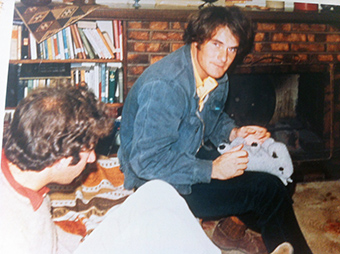
Jono and Paul in Sue and Karin's loungeroom.
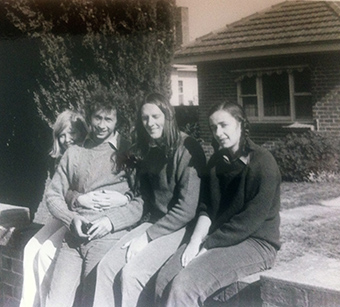
From left: Sue, Jono, Libby Taylor and Anne Hayman at Jono and Paul's house
My memories of Sale High School are of fairly harmless country kids, an almost absent Principal and of the power base of the experienced male staff members, known in later years as ‘the boys’. ‘The boys’ resided in a separate staff room, from which came a fog of cigarette smoke, loud male laughter and much footy and cricket talk. A male sanctum, but not for first year male teachers who were not eligible for membership. The rest of us were allocated one of the wooden desks that lined the sides of the small staffroom Tea and coffee making also happened there, right behind my desk.
My desk was next to Mrs Derham’s. She was my confidant and saviour in those hectic first weeks. She was actually quite a lady, probably in her fifties, taught Science, had umpteen children and lived out of town on what was probably a not very profitable farm. She was a very interesting person and it would have been good to know her story as her father was the Chancellor at Melbourne University.
Enough of school, as I can quite honestly say that the highlight was undoubtedly the social life. We first year teachers had a ball. Too busy in the week, but on the weekends we went to the beach, went to the pub, drove to Bairnsdale for Chinese, and had hilarious dinner parties where we played Cludo to all hours. One of the married teachers - he even had children - introduced us to red wine and the art of bottling . This involved a day trip to Chateau Tabilk to buy the bulk wine and a Sunday of bottling. We even had a few trips to Buller and Buchan. Jono Hayman organised one of these trips to the lodge he belonged to at Buller. I was most impressed, and not only by the lodge called Wapiti. The rest is history!!!!
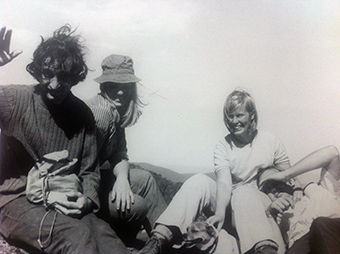
From left Mike Pollack, Margaret, Susan and Rosso hiking at The Cobberas
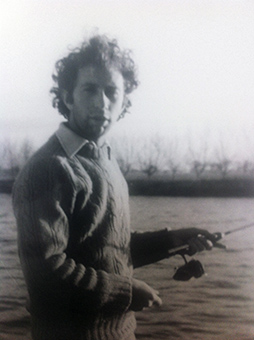
Jono
FIRST YEAR TEACHING AT MOE 1973
Maybe no-one feels in control of their destiny when they’re twenty-one. And maybe everyone thinks they know better than everyone over thirty.
In early February of 1973, I packed my few possessions into my car, picked up Lauren, the only uni friend who had also been appointed to the Latrobe Valley and drove us to Moe Hotel-Motel, where we had booked a room for one night. I had spent a total of six weeks in secondary schools in the previous year. I had taught some very fine lessons, up to two a day, with the class teacher sitting in a back desk. I knew that I disapproved of Skinner and his deterministic attitudes to education. I applauded the free schooling movement in England and America. I was undaunted and full of confidence.
That afternoon I headed up the kilometre or so to the High School. Only Jock, the ancient school cleaner, was there. He pointed me to an empty desk in a staffroom crowded with desks, and advised me, in such strong terms that it has stayed burned into my memory, that I must not let them get away with anything, because all the children were little monsters. I probably smiled indulgently at him. What would he know?
Later that day, Lauren and I visited the flirtatious Moe real estate agent who promised to search out something for us. I don’t know why we thought we could do this at the last moment like that, but by the next day we had signed a lease for a farm house at Hill End, up in the nearby hills. We didn’t even go and look at it.
A few months earlier we studentship holders had filled in a form stating our preferences for our first teaching appointments. But the deal was… you went where you were sent. Moe was only a couple of hours away. I was pretty lucky.
I remember only snatches of the first half year’s classes: Ian Grace nearly strangling a girl with my scarf (don’t ask); loosing my temper with One A, keeping them in at lunchtime and ranting at them, with the sudden revelation that they were sitting in silence because I had told them to; being painfully aware of the Deputy Principal lurking outside my room glaring; teaching Chaucer to the HSC Literature class in the Sixth Form “Common Room”. Gradually I found my feet. I befriended the office staff and the librarian, I explored new ways of bringing the dusty old text books to life, I held my first parent interviews and learnt that the kids liked me.
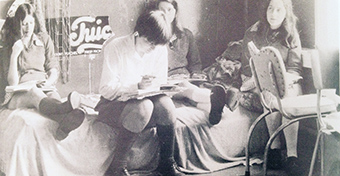
Form Six Lit class in the Common Room
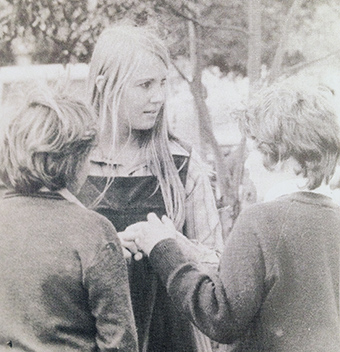
Solving an issue on yard duty
The rhythms of the school year became the rhythms that would govern my life for another thirty-five years.
Within a term I had broken off with my city boyfriend, and began spending weekends with my new colleagues. By mid year, it was clear which of the “first year outs” were only marking time until they could get back to the city. Their cars were always on the road by three thirty on Friday afternoons, while most of us were heading for the pub.
Our home at Hill End was a revelation. Lauren, a country girl, taught me to collect bark to light our wood stove, as we walked over the paddocks. We had a handful of power points, a small LPG gas fridge, a smoky open fire in the small front room, a large country kitchen and a bedroom each. Four rooms. The toilet was at the end of the back garden. The bathroom was a lean-to, where water in a bucket froze in the winter. Our drinking water, which we had to strain for mosquito larvae wrigglers, came from a tank.
The phone, ancient even by 1973 standards, was a wooden box on the wall with a handle to turn. This rang a bell in the Hill End Post Office, where, after a while, the lady would answer, ask which number you would like, and then put you through. And then she listened into your conversation. Maybe she didn’t with anyone else, but we were “the teachers” and we lived in “the teachers’ house”. We were young and interesting: we had parties and men who stayed over.
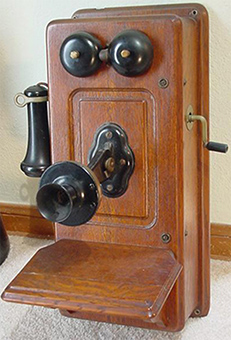
Our Hill End Phone
Bob, dairy farmer and our landlord, also found us very interesting. We knew that he stood sometimes in the darkness and looked in at us. Bob had been born in our house.His parents had retired to Lakes Entrance, leaving Bob living in the house he had built a hundred meters down the road, with the girl from nearby Trafalgar whom he had married.
Hill End, a tiny dairy farming town, half an hour north of Moe, had a few houses, the General Store/Post Office, a Primary School and the Hall with its tennis courts. The air was clean, the traffic minimal and the pace of life undetectable. On school days we would drive down into the “valley” with its sulphurous yellow smog.
Sometimes, if we left for home after dark, we would find ourselves in dense fog. There were two bridges over the Latrobe River to be navigated before the Hill End Road opened out. One of the bridges was being rebuilt in 1973. What we would now expect to be signposted as “changed road conditions ahead” was a bewildering and ever changing series of by passes. I remember one whited out evening, losing my way, knocking on a door and being confronted by Roxanne Jones from Year 9, whose leering father offered me a bed for the night. That night, and lots of others, I spent in town with friends, making use of the change of clothes I had learned to keep in the boot.
By December I had won most of my battles. “Never smile until Easter” would have been a good idea in hindsight, but, like kids everywhere, most of the Moe kids were forgiving and good natured. Many of them were also poor, needy, abused, illiterate and thirsty for new experiences.
I had joined the Yallourn Madrigal Singers, but every other aspect of my life revolved around the school. We were actively encouraged to try things, to organise and run camps, to start up after-school clubs, to put together musicals, to search out other community members to help, to sponsor, to join in. Before the days of litigation fear, before data collection and evidenced based assessment, before the crowded curriculum.
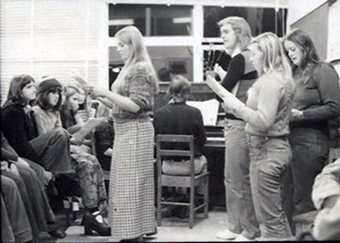
HMS Pinafore rehearsals. The first of over thirty school musicals.
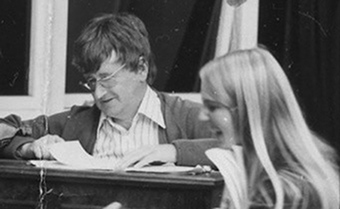
Roger, Deputy Principal and mentor, discussing a Musical Score
I was a more skilled teacher later on. My students wrote better essays, got higher HSC scores, learned self discipline and better manners. But I know that, for all our rawness and lack of experience, we young teachers changed the lives of those 1970s Moe kids.
LIFE OPENS UP AT SALE HIGH SCHOOL 1971
What a learning curve!!! Out in the wide world and what a wonderful world it turned out to be; very scary for a few months but exciting. The scary part was the teaching; the exciting part was the socialising and the ‘abentures.’
Having been granted a studentship I was legally bound to apply for country schools I was more than happy to do so and applied for Mansfield, Alexandra Omeo Corryong etc etc. We had to apply for at least twenty schools and I hoped I would be appointed to one of these most desirable of locations so that I could learn to ski and continue bushwalking. I was appointed to Sale High School and informed in the letter to report at the beginning of Term 1 1971 to Mr A Aitchison, the Principal. Terrifying reality.
I set off the day before the beginning of Term 1, all my possessions crammed into my Hillman Minx, and headed off to a new life and a huge learning curve. I had booked a room at the Midtown Motel in Sale, this in itself a new experience, and on arrival, settled in to nervously await the next day. Unknown to me I was not alone, as seventeen other young teachers were also beginning their teaching careers at Sale the next day.
Our introduction to teaching was quite perfunctory and most inadequate. On arrival in the Principal’s office we were given a teaching allocation, a time table and a list of Estate Agents. I discovered that I was to teach every year level, including Year 11 and 12 and run the Art Department that the previous Head had left bankrupt. Ridiculous!!! The students arrived back the next day at 9 AM and Term 1 began, despite the record floods that had inundated half the school grounds . In the meantime we had a short Staff Meeting and were then given the afternoon to find somewhere to live, hence the list of Estate Agents.
House hunting began . Armed with our list Karin Frede and I set off. Karin was a German and English first year teacher and fortunately for both of us, our partnership worked very well and we became friends for many years. Unknown to me at this time, a serious young man with a mass of curly dark hair, short pinkish Bermuda shorts, long white socks pulled up the knee and feet clad in Clarks desert boots was also looking for a house. He had chosen as a running mate Paul Ryan, also first year out and a Maths teacher. They had chosen each other on the basis that they both wore Clarks desert boots and that this had to be a good thing. An inspired choice by the four of us, as we all became firm friends, and two marriages also resulted from that chance meeting.
Karin and I found a rather soulless flat in a cream brick veneer block. At the end of Term 1 we moved to a much cosier small workers cottage but we had to get through Term 1 first. That afternoon we signed a lease for the Term, moved in and bought some food. Not much! We mostly ate muesli and waffles for the first month. We didn't have time to cook. There were endless lessons to prepare, correction and interesting boys to meet.

Jono and Paul in Sue and Karin's loungeroom.

From left: Sue, Jono, Libby Taylor and Anne Hayman at Jono and Paul's house
My memories of Sale High School are of fairly harmless country kids, an almost absent Principal and of the power base of the experienced male staff members, known in later years as ‘the boys’. ‘The boys’ resided in a separate staff room, from which came a fog of cigarette smoke, loud male laughter and much footy and cricket talk. A male sanctum, but not for first year male teachers who were not eligible for membership. The rest of us were allocated one of the wooden desks that lined the sides of the small staffroom Tea and coffee making also happened there, right behind my desk.
My desk was next to Mrs Derham’s. She was my confidant and saviour in those hectic first weeks. She was actually quite a lady, probably in her fifties, taught Science, had umpteen children and lived out of town on what was probably a not very profitable farm. She was a very interesting person and it would have been good to know her story as her father was the Chancellor at Melbourne University.
Enough of school, as I can quite honestly say that the highlight was undoubtedly the social life. We first year teachers had a ball. Too busy in the week, but on the weekends we went to the beach, went to the pub, drove to Bairnsdale for Chinese, and had hilarious dinner parties where we played Cludo to all hours. One of the married teachers - he even had children - introduced us to red wine and the art of bottling . This involved a day trip to Chateau Tabilk to buy the bulk wine and a Sunday of bottling. We even had a few trips to Buller and Buchan. Jono Hayman organised one of these trips to the lodge he belonged to at Buller. I was most impressed, and not only by the lodge called Wapiti. The rest is history!!!!

From left Mike Pollack, Margaret, Susan and Rosso hiking at The Cobberas

Jono
FIRST YEAR TEACHING AT MOE 1973
Maybe no-one feels in control of their destiny when they’re twenty-one. And maybe everyone thinks they know better than everyone over thirty.
In early February of 1973, I packed my few possessions into my car, picked up Lauren, the only uni friend who had also been appointed to the Latrobe Valley and drove us to Moe Hotel-Motel, where we had booked a room for one night. I had spent a total of six weeks in secondary schools in the previous year. I had taught some very fine lessons, up to two a day, with the class teacher sitting in a back desk. I knew that I disapproved of Skinner and his deterministic attitudes to education. I applauded the free schooling movement in England and America. I was undaunted and full of confidence.
That afternoon I headed up the kilometre or so to the High School. Only Jock, the ancient school cleaner, was there. He pointed me to an empty desk in a staffroom crowded with desks, and advised me, in such strong terms that it has stayed burned into my memory, that I must not let them get away with anything, because all the children were little monsters. I probably smiled indulgently at him. What would he know?
Later that day, Lauren and I visited the flirtatious Moe real estate agent who promised to search out something for us. I don’t know why we thought we could do this at the last moment like that, but by the next day we had signed a lease for a farm house at Hill End, up in the nearby hills. We didn’t even go and look at it.
A few months earlier we studentship holders had filled in a form stating our preferences for our first teaching appointments. But the deal was… you went where you were sent. Moe was only a couple of hours away. I was pretty lucky.
I remember only snatches of the first half year’s classes: Ian Grace nearly strangling a girl with my scarf (don’t ask); loosing my temper with One A, keeping them in at lunchtime and ranting at them, with the sudden revelation that they were sitting in silence because I had told them to; being painfully aware of the Deputy Principal lurking outside my room glaring; teaching Chaucer to the HSC Literature class in the Sixth Form “Common Room”. Gradually I found my feet. I befriended the office staff and the librarian, I explored new ways of bringing the dusty old text books to life, I held my first parent interviews and learnt that the kids liked me.

Form Six Lit class in the Common Room

Solving an issue on yard duty
The rhythms of the school year became the rhythms that would govern my life for another thirty-five years.
Within a term I had broken off with my city boyfriend, and began spending weekends with my new colleagues. By mid year, it was clear which of the “first year outs” were only marking time until they could get back to the city. Their cars were always on the road by three thirty on Friday afternoons, while most of us were heading for the pub.
Our home at Hill End was a revelation. Lauren, a country girl, taught me to collect bark to light our wood stove, as we walked over the paddocks. We had a handful of power points, a small LPG gas fridge, a smoky open fire in the small front room, a large country kitchen and a bedroom each. Four rooms. The toilet was at the end of the back garden. The bathroom was a lean-to, where water in a bucket froze in the winter. Our drinking water, which we had to strain for mosquito larvae wrigglers, came from a tank.
The phone, ancient even by 1973 standards, was a wooden box on the wall with a handle to turn. This rang a bell in the Hill End Post Office, where, after a while, the lady would answer, ask which number you would like, and then put you through. And then she listened into your conversation. Maybe she didn’t with anyone else, but we were “the teachers” and we lived in “the teachers’ house”. We were young and interesting: we had parties and men who stayed over.

Our Hill End Phone
Bob, dairy farmer and our landlord, also found us very interesting. We knew that he stood sometimes in the darkness and looked in at us. Bob had been born in our house.His parents had retired to Lakes Entrance, leaving Bob living in the house he had built a hundred meters down the road, with the girl from nearby Trafalgar whom he had married.
Hill End, a tiny dairy farming town, half an hour north of Moe, had a few houses, the General Store/Post Office, a Primary School and the Hall with its tennis courts. The air was clean, the traffic minimal and the pace of life undetectable. On school days we would drive down into the “valley” with its sulphurous yellow smog.
Sometimes, if we left for home after dark, we would find ourselves in dense fog. There were two bridges over the Latrobe River to be navigated before the Hill End Road opened out. One of the bridges was being rebuilt in 1973. What we would now expect to be signposted as “changed road conditions ahead” was a bewildering and ever changing series of by passes. I remember one whited out evening, losing my way, knocking on a door and being confronted by Roxanne Jones from Year 9, whose leering father offered me a bed for the night. That night, and lots of others, I spent in town with friends, making use of the change of clothes I had learned to keep in the boot.
By December I had won most of my battles. “Never smile until Easter” would have been a good idea in hindsight, but, like kids everywhere, most of the Moe kids were forgiving and good natured. Many of them were also poor, needy, abused, illiterate and thirsty for new experiences.
I had joined the Yallourn Madrigal Singers, but every other aspect of my life revolved around the school. We were actively encouraged to try things, to organise and run camps, to start up after-school clubs, to put together musicals, to search out other community members to help, to sponsor, to join in. Before the days of litigation fear, before data collection and evidenced based assessment, before the crowded curriculum.

HMS Pinafore rehearsals. The first of over thirty school musicals.

Roger, Deputy Principal and mentor, discussing a Musical Score
I was a more skilled teacher later on. My students wrote better essays, got higher HSC scores, learned self discipline and better manners. But I know that, for all our rawness and lack of experience, we young teachers changed the lives of those 1970s Moe kids.
Comments

